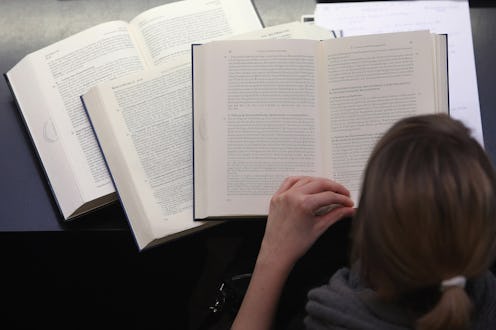Life
Could Colleges Just Ditch Textbooks?

The cost of college has gotten ridiculous in recent years, and it's not just because of tuition; other costs of attendance are significant, too. Fortunately, at least one school is trying to help students out — the University of Maryland University College is eliminating textbooks in an effort to help keep students' costs down. Will it help?
University of Maryland University College is one of the largest public universities in the country, with over 90,000 students enrolled either online or on campus. And now those students will hopefully have a little extra cash in their pockets — or more likely, student loans that are a little smaller.
So how is it possible to eliminate textbooks? Well, it's all thanks to the Internet, which makes it possible for professors and department heads to put together their own collection of information using online resources. "Twenty years ago you had to leave it up to a textbook company to come up with all the information," UMUC Assistant Vice President Bob Ludwig explained. "Now you can curate a lot of the material.”
In other words, all those big heavy books that you used to have to cart around campus may soon be a thing of the past.
So how much of a difference will this make in terms of the cost of education? Well, it's no secret that textbooks are expensive. According to College Board, during the 2014-2015 school year, the average student spent over $1,200 on books and supplies, just in one year, and text books are a significant part of that. Between 2004 and 2014, the cost of textbooks went up 82 percent, more than triple the rate of inflation.
Plus, textbook companies are notorious about trying to make it difficult for students to resell their textbooks, which can save students money by letting them buy used books, and can let students recoup some of their costs by letting them sell their books once they don't need them anymore. Publishers typically release new editions every few years to try to disrupt the resell market; now they are also turning to ebooks to help ensure customers have to buy from them directly.
So in light of all that, eliminating textbooks and letting students access the university's online resources for free instead sounds like a great money saving move. As far as how much of a difference it makes in the grand scheme of things, though, that's a little more questionable.
Spending over $1,200 for books and supplies is a significant amount of money, but based on College Board's calculations of student expenses, it only amounts to about five percent of the yearly cost of attending an average public university in-state. It's an even smaller slice of the pie if you're attending a university out of state or going to a private school. So sadly eliminating textbooks isn't suddenly going to make college affordable overnight.
Still, it is perhaps more of a significant step than it seems at first glance. Often times, financial aid and scholarships don't cover expenses like buying books, meaning that for many people, books can be the biggest expense out of pocket expense, and eliminating textbooks could go a long way to making school more affordable. Plus, saving yourself from an unnecessary few thousand in extra student loans is always nice, even if it isn't your biggest expense.
Hopefully other universities will also consider kicking textbooks off campus — and come up with even more ways to keep school affordable. Because we seriously need it.
Image: Giphy